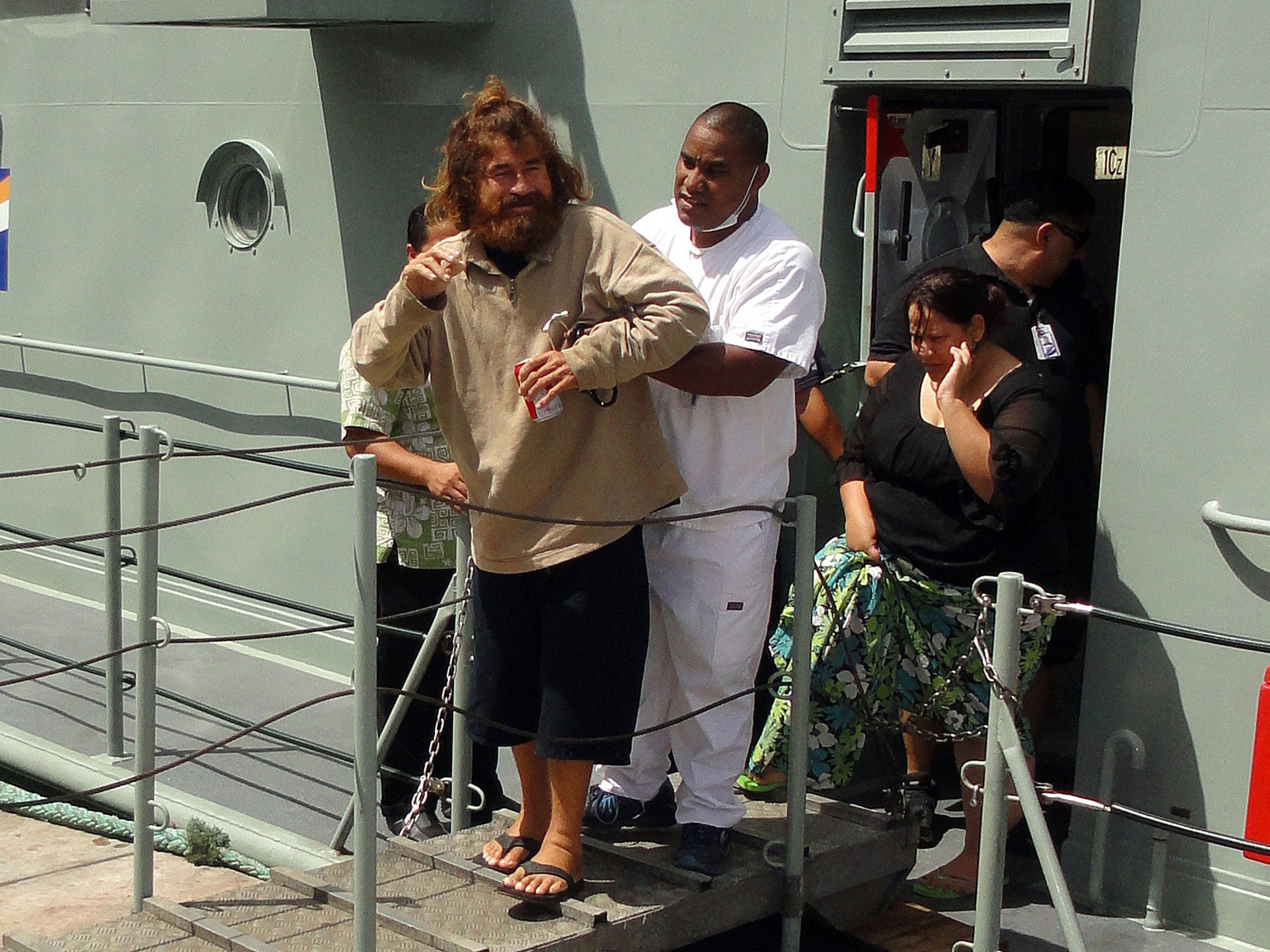Castaway Jose Salvador Albarengo back on dry land after 13 months lost at sea – bearded but unbowed
How did José Salvador Alvarenga survive for so long – on so little? Tim Walker tells his remarkable story

Bearded, bloated and wearing nothing but his bedraggled underwear, José Salvador Alvarenga stumbled ashore on a remote island in the Pacific last week with a remarkable story to tell. After setting off from the Mexican coast for a day’s fishing in December 2012, the 37-year-old claimed he had drifted across at least 5,500 miles of ocean to the Marshall Islands, surviving on little more than fish, birds and turtle blood.
On Monday, Mr Alvarenga arrived in the archipelago’s capital, Majuro, following a 22-hour journey from the coral atoll of Ebon, where he first washed up. Clutching a can of cola as he was helped down the gangplank of a police boat, he appeared to be in moderately good health.
Doctors suggested, however, the castaway could be suffering from edema, a condition which causes the body to swell after exposure to excessive sunlight and salt.
Mr Alvarenga spent 30 minutes meeting with local officials and the US Ambassador to the Marshall Islands, Thomas Armbruster, before being taken to a local hospital. Mr Armbruster acted as an interpreter for Mr Alvarenga, who speaks only Spanish.
But the details of the man’s ordeal remained in question and he reportedly contradicted himself several times.
“He looked better than one would expect,” Mr Armbruster said. “It’s hard for me to imagine someone surviving 13 months at sea. But it’s also hard to imagine how someone might arrive on Ebon out of the blue. Certainly this guy has had an ordeal and has been at sea for some time.”
According to Mr Alvarenga, he was born in El Salvador, the son of a baker, but moved to Mexico more than 15 years ago, where he worked as a shark and shrimp fisherman for a man called Willie, who paid him 25 pesos (£1.14) per pound of fish. On 21 December 2012, he went fishing for sharks in a 23ft fibreglass boat with his colleague Ezekiel, whose age he estimated at between 15 and 18.
The boat’s motor failed and for days the pair drifted close to the coast of Mexico, until the craft was swept out into the vast Pacific. Four months into their ordeal and unable to digest the raw food they had caught to eat, Ezekiel died.
Mr Alvarenga said he had rolled the younger fisherman’s body over the side of the boat and for several days contemplated taking his own life.
But with a knife and a meagre covering to keep off the sun, he carried on, catching fish, birds and turtles to eat – even a small shark, which he lured by putting one hand in the water, then grabbing it by the tail.
When there was no rain, he drank the blood of birds and turtles, or his own urine. Speaking to The Telegraph at a hospital in Majuro, the castaway said he soon lost any awareness of dates or how long he had been at sea. “I only knew the sun and the night,” he said. “I never saw land. Pure ocean, pure ocean. It was very placid – only two days with big waves.”
Mr Alvarenga, who has a 10-year-old daughter, said he kept himself going by thinking of his family. “I thought about them all the time,” he said. “I think that by now they think that I am dead. So I want to go home and show them that I am alive. I thank God that I am here.”
Last Thursday, the boat finally ran aground on a coral reef at Ebon Atoll, the southernmost point of the Marshall Islands – some 5,500 miles from Southern Mexico.
“I had just killed a bird to eat and saw some trees,” Mr Alvarenga said. “I cried: ‘Oh God’. I got to land and had a mountain of sleep. In the morning I woke up and heard a rooster and saw chickens and saw a small house. I saw two native women screaming and yelling. I didn’t have any clothes – I was only in my underwear and they were ripped and torn.”
The locals who found Mr Alvarenga were accompanied by a Norwegian anthropology student, Ola Fjelstad, who was living on Ebon Atoll. Mr Fjelstad told the BBC that the castaway’s boat was “grown over with shells and other sea animals. It had a live baby bird, a dead turtle, some turtle shells and fish leftovers inside.”
Mr Alvarenga is not the first to survive such an experience. In 2006, three Mexican fisherman were also found drifting near the Marshall Islands in a small fibreglass boat, nine months after setting sail. They too survived on rainwater, fish and birds, and on readings from a copy of the Bible.
Marshall Islands authorities said they were still trying to track down Mr Alvarenga’s family in El Salvador and arrange his repatriation.
Watch: What's the real story behind the Mexican castaway?
Subscribe to Independent Premium to bookmark this article
Want to bookmark your favourite articles and stories to read or reference later? Start your Independent Premium subscription today.

Join our commenting forum
Join thought-provoking conversations, follow other Independent readers and see their replies